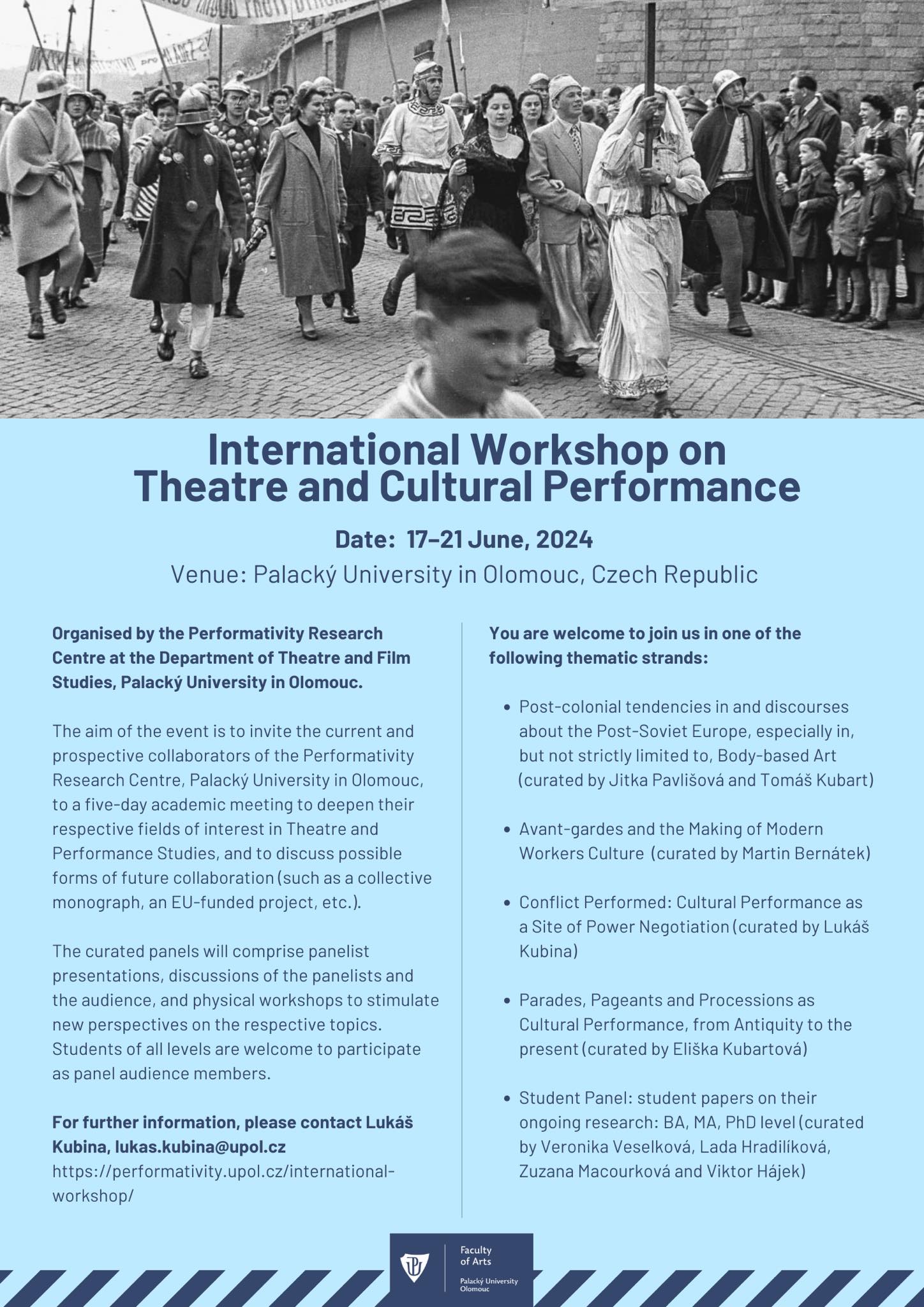International Workshop on Theatre and Cultural Performance
Date: 17.-21. 6. 2024
Venue: Palacký University in Olomouc, Czech Republic
Organised by the Performativity Research Centre at the Department of Theatre and Film Studies, Palacký University in Olomouc
The aim of the event is to invite the current and prospective collaborators of the Performativity Research Centre, Palacký University in Olomouc, to a five-day academic meeting to deepen their respective fields of interest in Theatre and Performance Studies and to discuss possible forms of future collaboration (such as a collective monograph, an EU-funded project, etc.).
Annotation
Cultural performances encompass a diverse array of expressions, ranging from theatrical productions, dance, music, and various forms of performing arts to religious processions, protest marches, national holiday celebrations, sports events, and even the everyday interactions occurring within the theatre’s corridors, work meetings, or political party gatherings. These cultural manifestations form a complex web of relationships that profoundly influence the fabric of our society and its understanding of itself.
From one perspective, a theoretical framework rooted in performativity offers a valuable lens through which to demystify the often abstract underpinnings of dominant ideologies. It allows us to dissect how socio-cultural narratives take shape and reveals the strategies employed by those in positions of power, while also shedding light on the tactics employed by the marginalized and disenfranchised. By delving into the performative dimensions of cultural events, our exploration extends beyond the mere analysis of outcomes. It invites us to shift our focus toward the embodied experience, the realm of affective actions, and the crucial role that emotions play in the culture.
The Performativity Research Centre is organising an international workshop, the aim of which is to create time and space for focused discussion and intensive encounters between actors from different academic and artistic disciplines. The workshop aims to explore these themes, share methodological approaches, examples of formats through which these themes are treated, and to think together about strategies for translating research findings to professional and lay audiences. At a time when neoliberalism and conservatism are gaining a hegemonic position in European society, when there have been fundamental changes in everyday bodily practices under the influence of the covid-19 pandemic when geopolitical relations have changed under the influence of the war in Ukraine, we consider it essential to reflect on how to organize, connect, form resilient networks and cross horizons.
Thematic sections
You are welcome to join us in one of the following thematic strands:
Decolonising approaches to performativity and the creation of socio-cultural narratives
Curated by Jitka Pavlišová and Tomáš Kubart
The workshop, which will focus on decolonizing methodological approaches and strategies in contemporary dance and performance art, will span five days, with the first day divided into two working groups. The initial „East Central European Body Identities in Contemporary Dance and Performance Art“ workshop will build upon the international workshop held in Frankfurt am Main in May 2023. It will explore approaches to the (de)colonization of „marginalized“ European regions, led by Jitka Pavlišová (UP). The second workshop, „The Fascist Man: Psycho-Social Manifestations of Colonialism,“ led by Tomáš Kubart, will address the perception of colonialism in the Central European region (Austria, Germany). These two workshops will be combined on the second day.
Commencing with our inquiries, we will observe how decolonial practices manifest in academics not directly engaged in postcolonial studies. The unique position of the former Czechoslovakia, which was neither colonized nor engaged in colonization itself (except for a failed plan to colonize Togo), allows for the necessary distance to frame the question of (de)colonialism, perhaps. Austria is a similar example, but being on the ‚oap‘ side of the Iron Curtain, the approach of Austrian policymakers to the issue of decolonization differs. These questions will be explored on the second day of the joint workshop. How can the people of the Czech Republic or Austria discuss colonization without direct colonial experience? While postcolonial studies provide the necessary perspective commonly operated in Western universities, it no longer propels our work forward – precisely because these regions existed somewhere in between. We are interested in marginalized regions of post-Soviet culture and society, such as the former Czechoslovakia and East Germany, the Baltic countries, and Poland.
Contact:
Jitka Pavlišová: jitka.pavlisova@upol.cz
Tomáš Kubart: kubart@ucl.cas.cz
Avant-gardes and making of modern workers‘ culture
Curated by Martin Bernátek
This thematic section explores the heterogeneity of working-class cultural practices and their relation to artistic avant-garde from the late 19th century to the post-WWII era, primarily but not exclusively in Central-Eastern Europe. Our ambition is to provide a platform for comparative and cross-sectional research exchange and future collaboration with an interest in foregrounding performances, theatricality, and performative modes of action as significant aspects of the constitution of workers‘ identity and avant-garde artistic tactics.
In addition to examining the collaboration between workers and avant-garde theatres, including mass gymnastics exercises, manifestations, or protests, we aim to explore these modes of action about education, political philosophy, industrial methods, sexuality, health care, and social care policies, gender divide, or religious practices in the interplay between avant-garde and working class. We welcome contributions in the form of presentations or academic papers, commentary on historical sources, as well as curatorial concepts in various states of elaboration that go beyond geographic nationalism, media specificity, and the separation of political and aesthetic aspects in studying modern societies.
We encourage everyone who uses or wants to test concepts such as staging, script, role, scenography, and atmosphere to study avant-garde and working-class relations as examples of a complex, diverse, and often contradictory process of negotiating modern transcultural identity in particular and the relationship between power and culture in general.
Contact
Martin Bernátek: martin.bernatek@upol.cz
Conflict Performed: Cultural Performance as a Site of Power Negotiation
Curated by Lukáš Kubina
Cultural performances form a rich tapestry of expressions, encompassing theatrical productions, dance, music, and various performing arts, as well as religious processions, protest marches, national holiday celebrations, sports events, and everyday interactions within theaters, work meetings, or political party gatherings. These diverse manifestations create a complex web of relationships that significantly shape our society and its self-perception.
However, when we consider the performativity of conflict, a theoretical framework becomes crucial in unveiling the dynamics at play. This perspective provides a powerful lens through which to demystify the often abstract foundations of dominant ideologies. It enables us to dissect how socio-cultural narratives evolve, exposing the strategies of those in power and illuminating the tactics employed by the marginalized.
By delving into the performative dimensions of cultural events, we transcend mere outcome analysis. Instead, we are prompted to focus on the embodied experience, the realm of affective actions, and the pivotal role that emotions play in the cultural tapestry. What emerges is a pressing question: How does the performativity of conflict shape and redefine the narrative landscape, influencing not only our understanding of culture but also the very fabric of societal relationships?
Contact
Lukáš Kubina: lukas.kubina@upol.cz
Student Panel: student papers on their ongoing research: BA, MA, PhD level
Curated by Veronika Veselková, Lada Hradilíková, Zuzana Macourková and Viktor Hájek
Unlike the rest of the workshop, the student panel is not focused on any specific topic but focuses on a variety of different themes. Participants will have the opportunity to speak about any topic related to theatre and cultural performance, regardless of the individual thematic strands, highlighting novel theoretical and methodological approaches. The panel aims to create a space in which junior researchers can meet and share their interests, experiences, and points of view. Serving as a platform for students of all academic levels to present and discuss their research, the panel intends to broaden the participants’ horizons, establish new partnerships, and deepen the collaboration among students as well as other researchers.
Participants are expected to create a short 10-minute presentation in any form and a poster which will be available to all attendees of the workshop before the presentation as well as after the event. Presentations will be scheduled into two sections, each of which will be followed by a short discussion and feedback. A consultation about the upcoming edited collective anthology will follow the two presentation blocs. After the main segments, all participants are welcome to continue the discussions in the evening programme.
Contact
Veronika Veselková: veronika.veselkova01@upol.cz
The curated panels will comprise panelist presentations, discussions of the panelists and the audience, and physical workshops to stimulate new perspectives on the respective topics. Students of all levels are welcome to participate as panel audience members.
Workshop Programme
17.6. – Introduction and work in thematic groups
18.6. – Work in thematic groups and artistic workshop
19.6. – Joint excursion
20.6. – Group work and integration and Student Conference
21.6. – Plenary discussion
The workshop will take place at Performativity Research Centre, which is located in the former Jesuit Convent, the building of the Faculty of Arts of Palacký University in Olomouc, Czech Rep.
For further information, please contact Lukáš Kubina, lukas.kubina@upol.cz

